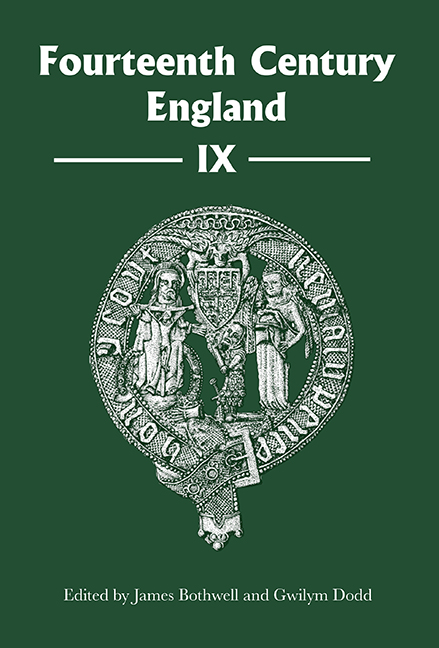Book contents
- Frontmatter
- Contents
- List of Illustrations
- Contributors
- Preface
- Abbreviations
- The Death of Edward II Revisited
- Living in the Shadows: John of Eltham, Earl of Cornwall (1316–36)
- Careers of the Lesser Parochial Clergy Before the Black Death
- Heritage and Symbolism: the Romans and Tanners in Fourteenth-Century York
- ‘Let Them Realize What God Can Do’: Chivalry in the St Albans Chronicle
- Historical Writing in the North-West Midlands and the Chester Annals of 1385–88
- High-Status Execution in Fourteenth-Century Ireland
- Traitor to the Chose Publique: Negotiating Constitutional Conflict Through the Law of Treason 1399–1402
- Notes and Documents – A Letter from Chatton: the Date and the Writer
- Fourteenth Century England Issn 1471–3020
Living in the Shadows: John of Eltham, Earl of Cornwall (1316–36)
Published online by Cambridge University Press: 07 May 2022
- Frontmatter
- Contents
- List of Illustrations
- Contributors
- Preface
- Abbreviations
- The Death of Edward II Revisited
- Living in the Shadows: John of Eltham, Earl of Cornwall (1316–36)
- Careers of the Lesser Parochial Clergy Before the Black Death
- Heritage and Symbolism: the Romans and Tanners in Fourteenth-Century York
- ‘Let Them Realize What God Can Do’: Chivalry in the St Albans Chronicle
- Historical Writing in the North-West Midlands and the Chester Annals of 1385–88
- High-Status Execution in Fourteenth-Century Ireland
- Traitor to the Chose Publique: Negotiating Constitutional Conflict Through the Law of Treason 1399–1402
- Notes and Documents – A Letter from Chatton: the Date and the Writer
- Fourteenth Century England Issn 1471–3020
Summary
Second son of Edward II and younger brother of Edward III, John of Eltham died aged only twenty while on campaign in Scotland on 13 September 1336. He enjoyed the briefest of active careers and died as Edward III was striving to redraw the political map of England and harness militant nationalism in the assertion of English predominance throughout the British Isles and beyond. Not unnaturally, this has left John lingering in the long shadows of his elder brother and his celebrated nephew and successor as earl / duke of Cornwall, Edward of Woodstock, the Black Prince. What little we do know about John comes from fragmentary references in chronicle accounts and printed primary sources, already well used by Scott Waugh for the Oxford Dictionary of National Biography. As Tom Beaumont James demonstrated in a detailed analysis of the propagandist retelling of John's death by later Scottish chroniclers, John has become obscured by his posthumous reputation for violence and supposed murder at the hands of his elder brother after a dramatic falling out on campaign. Mark Ormrod, moreover, in his recent biography of Edward III, has commented that by not coming of age John exercised little agency, and efforts to reconstruct his career and personality are ‘not easy to disentangle from the conventional representations of the age’. All of this arguably makes a reassessment of the man problematic if not otiose. However, there has been much recent scholarly debate on the methods by which Edward III negotiated the transition between his minority and personal rule and how he reforged the Crown's relationship with the peerage and reasserted the prestige of the English Crown after civil war and disharmony within the royal family. An examination of key aspects of his closest kinsman's short and underappreciated career – his infancy and adolescence, his estates, embryonic following and place within royal diplomacy and patronage networks – would perhaps be a timely addendum to this debate.
Such an examination underpins this chapter, which aims – through an analysis of some of the key sources for John's childhood, military career and ties of affinity – to make fruitful contributions to discussions of power relationships within the royal family at a time of crisis and renewal in the tumultuous period of transition between the second and third Edwards.
- Type
- Chapter
- Information
- Fourteenth Century England IX , pp. 23 - 48Publisher: Boydell & BrewerPrint publication year: 2016



